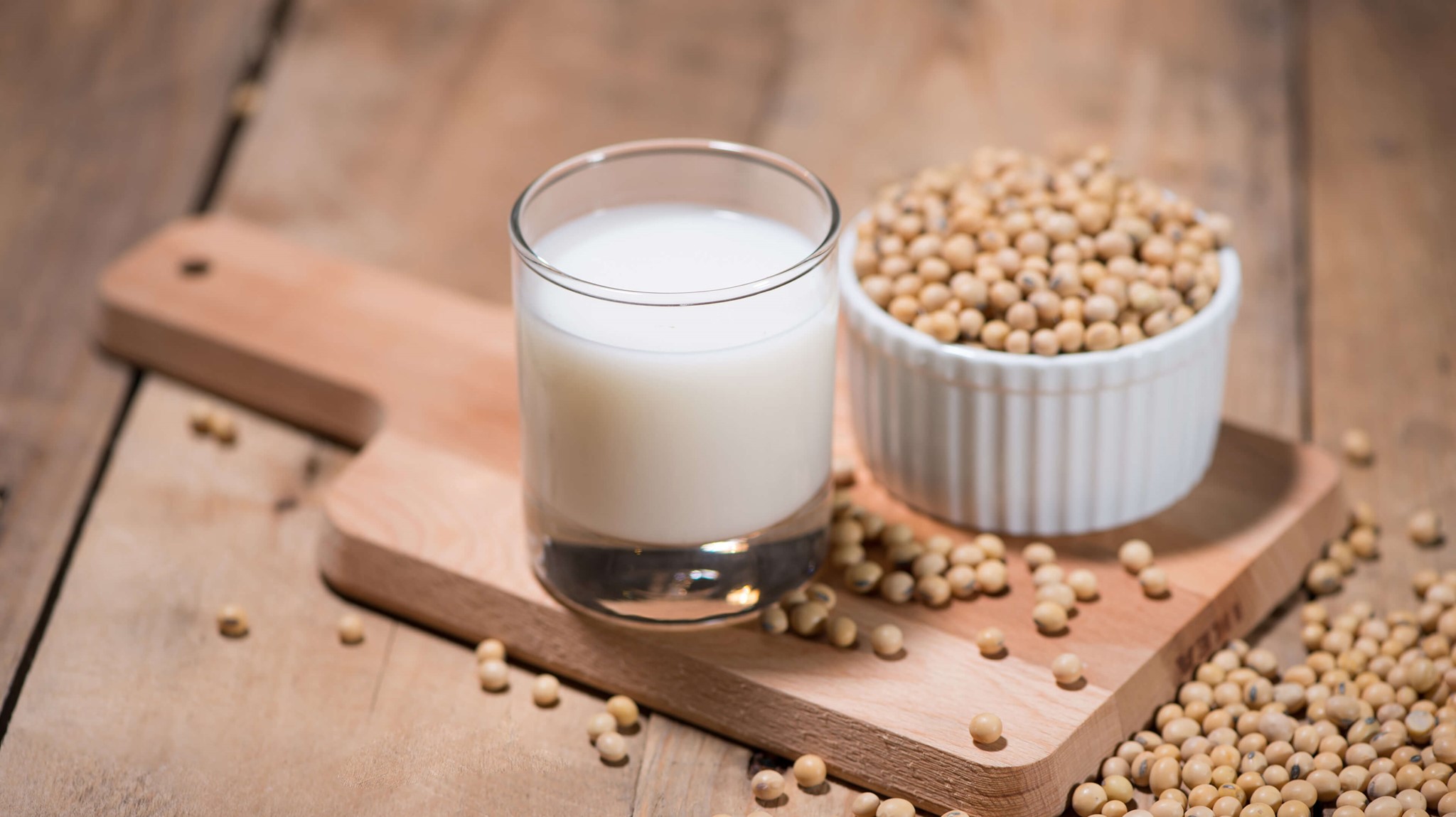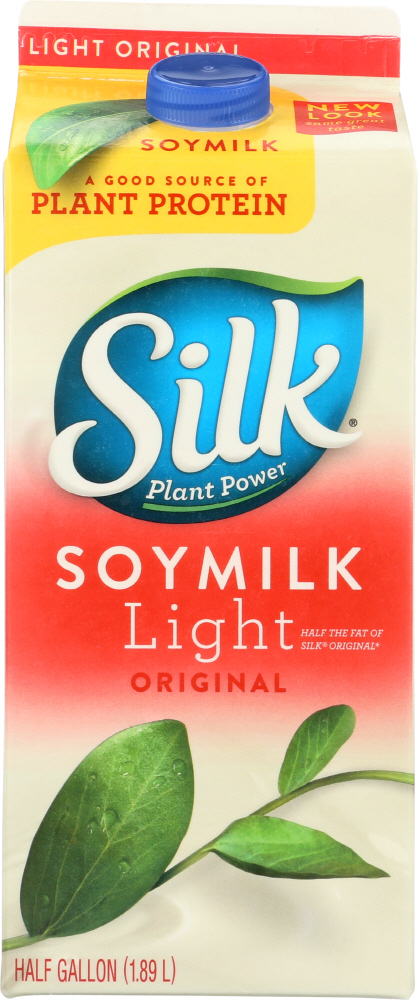Soy milk is a plant-based alternative to cow's milk that is made from soybeans. It is a popular choice for individuals who are lactose intolerant, allergic to dairy, or follow a vegan or vegetarian diet. The process of making soy milk involves soaking, grinding, and boiling soybeans, then straining the mixture to remove the solids. The resulting liquid is a creamy, off-white beverage that has a slightly sweet and nutty flavor. Soy milk is often fortified with vitamins and minerals to match the nutritional profile of cow's milk. It is a good source of protein, calcium, and vitamin D, and can be used as a substitute for cow's milk in various recipes, including coffee, tea, smoothies, and baking. It's important to note that while soy milk is a popular dairy alternative, there are several other plant-based milk options available, such as almond milk, oat milk, coconut milk, and rice milk, each with its own unique taste and nutritional composition.
The only thing you could assume to drown your cereal in is whole cow's milk. Now, cow's milk comes in all types of varieties: whole milk, 3 percent, 2 percent, skim (fat-free), and even lactose-free milk. For people with an allergy or dietary concerns, there are also other choices to cow's milk. Soy, rice, almond, and coconut "milk" are famous plant-based milk alternatives. They're becoming even more available in stores across Switzerland and other counttries. Goat's milk is common in stores in Switzerland but is another ideal choice for some people. Each kind of milk has its advantages and disadvantages. It depends on a person's health, nutritional needs, diet, or personal taste preferences. Soy milk originates from soybeans and filtered water. Like various plant-based milk alternatives, it may contain thickeners to increase consistency and shelf life.
Advantages of Soy Milk

Source: frigiv.palsgaard.com
You should add soy milk to your diet as a source of protein. According to the National Center for Complementary and Integrative Health, soy protein aids to lower levels of LDL, or bad cholesterol. Each cup of bitter and plain soy milk contains 7 grams of protein, according to the U.S. Department of Agriculture. Soy contains all nine essential amino acids unlike many plant-based proteins, which contain few, but not all of the amino acids you need in your diet. Your body connects these amino acids into new proteins, including antibodies vital for the structural proteins that hold your tissues together, immune system function, and enzymes that aid your cells to produce energy. It’s an ideal source of vitamin B-12, vitamin A, protein, potassium, and Moreover, it can be fortified with calcium and vitamin D. It accommodates as much protein as cow's milk, yet is lesser in calories than whole milk and about equal to the calories in 3 percent or 2 percent milk. It also has very little saturated fat.
Disadvantages of Soy Milk
However, various types of soy milk do have a major nutritional disadvantage because of their sugar content. Added sugars raise your calories without offering nutritional value and boost your risk of cardiovascular disease. Select bitter soy milk to reduce added sugar — it contains just a few grams of naturally occurring sugars and no added sugar. Vanilla and chocolate flavored soy milk, in contrast, contain 22 and 9 grams of added sugar per serving, respectively. Soy is a popular allergen for both adults and children. Too much soy may be a problem for children with thyroid conditions. Most of the soy produced in Switzerland comes from genetically modified plants, which is a concern to some.
Is soy milk unhealthy?
Soy milk is generally considered a healthy beverage and can be part of a balanced diet. Here are some points to consider regarding the health aspects of soy milk:
-
Nutritional Profile: Soy milk is a good source of plant-based protein, which is beneficial for muscle development, tissue repair, and overall health. It also contains healthy fats, dietary fiber, vitamins (such as vitamin D, vitamin B12, and vitamin K), and minerals (such as calcium, iron, and potassium). Many brands of soy milk are fortified with additional nutrients to enhance their nutritional value.
-
Heart Health: Soy milk is low in saturated fat and cholesterol, which makes it heart-friendly. Consuming soy protein as part of a balanced diet has been associated with lowering LDL cholesterol levels (the "bad" cholesterol) and reducing the risk of cardiovascular diseases.
-
Hormone-like Compounds: Soy contains compounds called phytoestrogens, specifically isoflavones, which have a chemical structure similar to estrogen. There have been concerns about the potential effects of phytoestrogens on hormone balance, particularly in women. However, current research suggests that moderate consumption of soy products, including soy milk, does not significantly impact hormone levels or pose a health risk. In fact, some studies indicate that soy consumption may have beneficial effects on certain hormone-related conditions.
-
Allergies and Sensitivities: While soy milk is a suitable alternative for individuals with dairy allergies or lactose intolerance, it's worth noting that some people may have soy allergies or sensitivities. If you have any known allergies or sensitivities to soy, it is best to avoid soy milk and opt for other non-dairy alternatives.
-
Non-GMO and Organic Options: Some individuals prefer to choose organic or non-GMO soy milk to ensure they are consuming a product that aligns with their preferences. These options are widely available in many markets.
As with any food or beverage, moderation is key. It's important to consider your individual dietary needs and preferences, as well as consult with a healthcare professional or registered dietitian if you have specific concerns or medical conditions.
Benefits of Soy milk: Which nutrients can be found in soy milk?
Soy milk is a nutritious beverage that contains a range of essential nutrients. While the exact nutrient composition can vary between brands and varieties, here are some common nutrients found in soy milk:
-
Protein: Soy milk is a good source of plant-based protein. It typically contains around 6-8 grams of protein per 1 cup (240 ml) serving. Protein is essential for building and repairing tissues, supporting immune function, and regulating various physiological processes.
-
Healthy Fats: Soy milk contains unsaturated fats, including polyunsaturated and monounsaturated fats, which are considered healthy fats. These fats can help promote heart health and provide energy for the body.
-
Carbohydrates: Soy milk contains carbohydrates, primarily in the form of complex carbohydrates, which provide energy. The carbohydrate content can vary depending on the brand and any added sweeteners.
-
Fiber: Soy milk may contain dietary fiber, which aids in digestion and can help regulate blood sugar levels. The amount of fiber can vary between different brands and types of soy milk.
-
Vitamins: Soy milk is often fortified with various vitamins to enhance its nutritional profile. Commonly added vitamins include vitamin D, vitamin B12, and vitamin K. Vitamin D helps with calcium absorption and supports bone health, while vitamin B12 is important for nerve function and the formation of red blood cells. Vitamin K plays a role in blood clotting and bone metabolism.
-
Minerals: Soy milk is often fortified with minerals like calcium, iron, and potassium. Calcium is crucial for building and maintaining strong bones and teeth. Iron is important for oxygen transport in the body, and potassium is involved in fluid balance, muscle function, and nerve signaling.
It's worth noting that the exact nutrient content can vary depending on the brand, fortification, and processing methods used. Reading the nutrition label on the soy milk package will provide specific information about the nutrient composition of the product you choose.
Which nutrients are in other milk that can't be found in soy milk?
Other types of milk, such as cow's milk and certain plant-based milk alternatives, may contain certain nutrients that are not naturally present in soy milk. Here are some nutrients that are commonly found in other types of milk:
-
Calcium: Cow's milk is a well-known source of calcium, a mineral that is essential for bone health and plays a role in other bodily functions. While soy milk is often fortified with calcium, cow's milk naturally contains higher levels of this mineral.
-
Vitamin B12: Cow's milk is a natural source of vitamin B12, a nutrient that is primarily found in animal-based foods. Vitamin B12 is important for nerve function, red blood cell production, and DNA synthesis. Plant-based milk alternatives like soy milk are usually fortified with vitamin B12 to match the nutrient content of cow's milk.
-
Vitamin D: Cow's milk is often fortified with vitamin D, a nutrient that helps the body absorb calcium and supports bone health. While some soy milk products are fortified with vitamin D, not all varieties may contain this nutrient.
-
Iodine: Cow's milk is a natural source of iodine, a mineral that is important for thyroid function and the production of thyroid hormones. Soy milk typically does not naturally contain iodine, but some brands may fortify their products with this mineral.
-
Riboflavin (Vitamin B2): Cow's milk is a source of riboflavin, which is involved in energy production, growth, and metabolism. Soy milk is usually fortified with riboflavin, but the levels may vary.
-
Phosphorus: Cow's milk naturally contains phosphorus, a mineral that is essential for bone health, energy production, and cell function. Soy milk may contain phosphorus, but the levels can be lower compared to cow's milk.
It's important to note that while certain nutrients may be naturally present in cow's milk or other milk alternatives, such as those mentioned above, many of these nutrients can be obtained from a well-balanced diet that includes a variety of foods. Additionally, the availability and fortification of nutrients in different types of milk can vary between brands and specific products. Checking the nutrition label or consulting with a healthcare professional or registered dietitian can provide specific information about the nutrient content of different milk options.
How much soy milk should one drink daily?

Random Soy Milk from food index
The recommended amount of soy milk or any other milk for an individual can vary depending on several factors, including age, sex, overall health, and dietary needs. However, there are general guidelines that can help you determine a suitable daily intake of soy milk.
The Dietary Guidelines for Americans recommend a daily intake of 2-3 cups (480-720 ml) of dairy or dairy alternatives, such as soy milk, for most adults. This recommendation includes all sources of milk and milk products consumed throughout the day.
It's important to note that this guideline is a general recommendation and can vary based on individual needs and preferences. Some individuals may require more or less depending on factors such as specific dietary goals, nutrient needs, and overall calorie intake.
If you have specific dietary concerns or health conditions, it is best to consult with a healthcare professional or a registered dietitian who can provide personalized recommendations based on your individual circumstances.
Additionally, it's worth mentioning that while soy milk can be a healthy part of a balanced diet, it is essential to diversify your nutrient intake by incorporating a variety of other foods and beverages to meet your nutritional needs.


